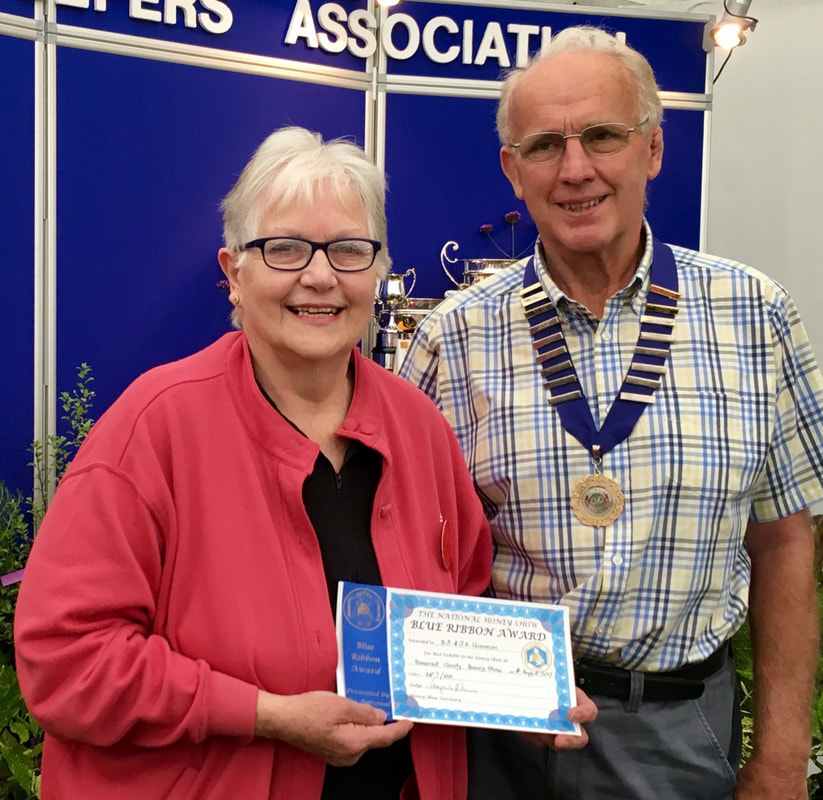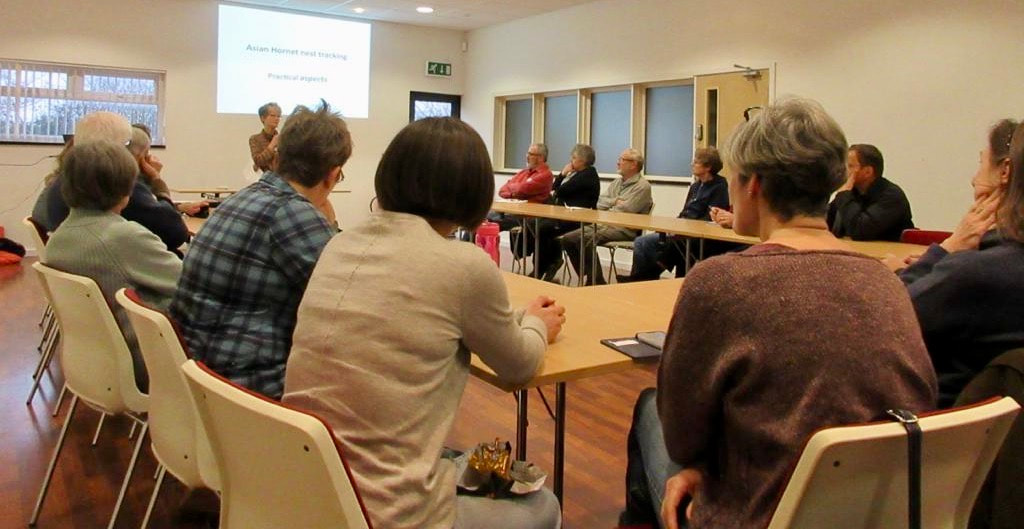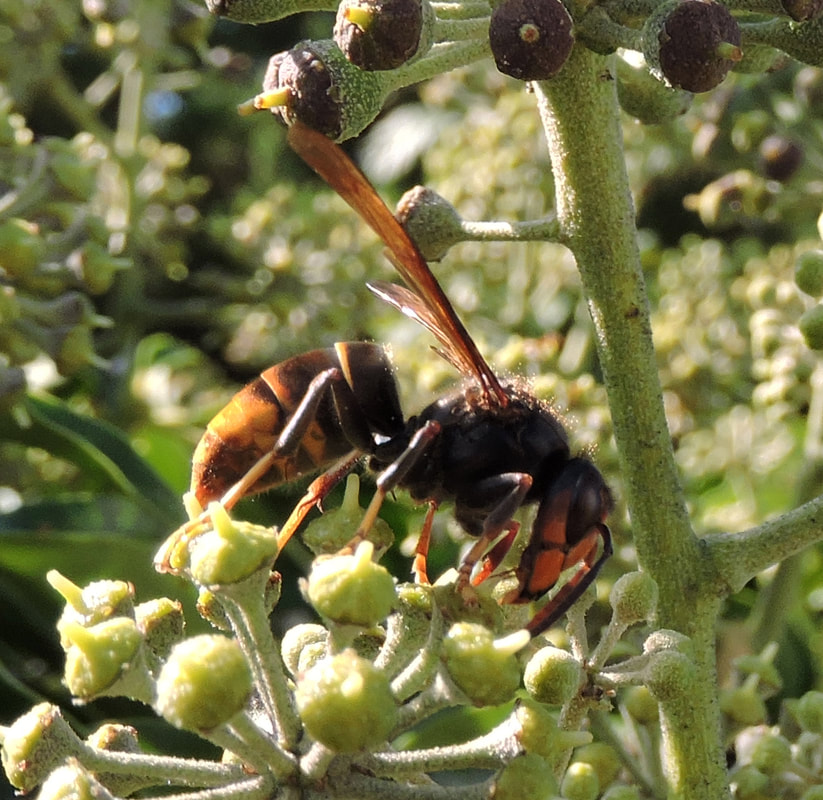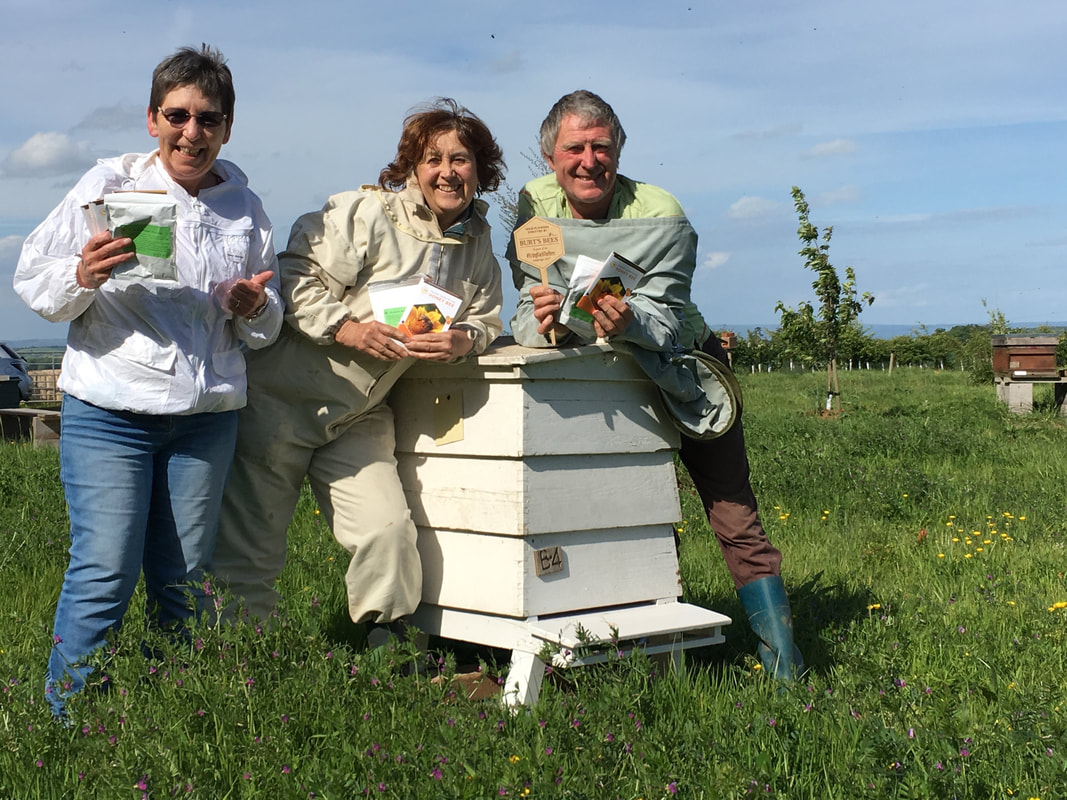|
Beekeepers from across the South West are getting ready to tackle the imminent threat of deadly Asian hornets ahead of the coming season following a training day held in Somerset.
Organised by Somerset and Devon Beekeepers’ Associations on behalf of the South West Beekeepers’ Forum, 150 beekeepers have returned to their beekeeping associations armed with the latest techniques to combat the insects which could decimate honeybees and other pollinators. Somerset’s Asian hornet action team co-ordinator Lynne Ingram said: “We are on the Asian hornet front line here in the South West and this training day was a great opportunity to prepare ourselves for the season ahead. “Asian hornets don’t respect boundaries so it was important to start preparing to work together across the region. Although it was mainly beekeepers who attended the event, one of the key messages to get across is that Asian hornets are not just a problem for beekeepers. “We now know that these hornets build nests in garden hedges, bramble patches, in holes in the ground and also on buildings. We will be working hard to educate the public so that everyone can recognise a hornet and report a sighting. With thousands of people looking out for them, we have some chance of slowing the invasion.” The day-long programme included presentations about the latest research from Dr Peter Kennedy of the University of Exeter and Alastair Christie, Jersey’s Asian hornet coordinator, who shared his experience tracking the non-native hornets on the Channel Islands. SWBKF Chair Peter Darley commented: “I certainly learned a lot from some very good speakers and workshops and came away with a far clearer idea on how to proceed in our preparations to fend off the coming invasion…All of us can learn from Somerset's lead and, as a Forum, we are lucky to have them and their experience to show us the way.” Asian hornets (Vespa velutina nigrithorax) have distinctive orange faces, yellow tipped legs and are smaller than the bright yellow striped European hornet. They are a notifiable invasive species and sightings should be reported immediately:
Ends Photos were taken at the Asian hornet training event held at Bridgwater, Somerset. Notes to editors: Somerset Beekeepers’ Association (SBKA) is a Registered Charity run by volunteers and works to advance the craft of apiculture within its membership and to promote general awareness and understanding of honeybees. SBKA has given all its members monitoring traps and identification materials and the county is covered by 12 Asian hornet action teams which are trained to help with identification and to assist bee inspectors with verifying and tracking sightings. Asian hornets are active mainly between April and November (peak August to September) and are inactive over the winter.
Somerset Beekeepers’ Association and Exmoor National Park Authority are today (September 4) calling on the public to be on the lookout for yellow-legged Asian hornets which pose a serious threat to honeybees and other pollinators.
Beekeepers, supported by Exmoor National Park staff, have been investigating an as yet unconfirmed sighting of the highly invasive Vespa velutina nigrithorax in the Minehead area. Asian Hornet Week runs from September 9 to 15 throughout the UK and coincides with a good opportunity to prevent the destructive insects getting a foothold. Anne Pike, chairman of SBKA, said: “Vigilance is a cornerstone of our defence strategy and we want to mobilise the county to be on the lookout throughout September and October to protect the environment we treasure so much.” Somerset Beekeepers have set up 12 Asian hornet action teams, which cover the county, to follow-up reported sightings and educate the public. Ali Hawkins, Exmoor National Park Wildlife Conservation Officer, said: “There is a real risk to our own native honeybee and European hornet if these alien species are allowed to take hold. Given the many pressures on our precious pollinators, including climate change, habitat destruction and pesticide use, it’s vital we do all we can to support them by reporting sightings. A good quality photo gives the best chance of tracking down the nest to prevent further invasions and Autumn represents the most likely time to see them on the wing.” People in both rural and urban environments are urged to check plants which are in flower and attracting insects in the coming weeks, such as ivy. Anne Pike added: “The difficulty of protecting the UK from Asian hornets is underlined by Jersey’s experience. The first Asian hornet was spotted on the island in 2016 and, in spite of the efforts of local beekeepers and volunteers, this year they have caught 69 queens, discovered 54 nests and are still looking for more.” The Asian hornet has a distinctive orange face and yellow tipped legs and is smaller than the bright yellow striped European hornet. Asian hornets are a notifiable invasive species and should be reported immediately, preferably with a photo using:
ends Anne Pike, Chairman of Somerset Beekeepers’ Association, tel: 07971 275840; email: [email protected] Ailsa Stevens, Communications Officer, Exmoor National Park Authority, tel: 01398 322244, mob: 07772 092128, email: [email protected] Pic cap: An Asian hornet foraging on ivy in Brittany. Photo credit: Stewart Gould, Somerset Beekeepers’ Association Notes to editors: Somerset Beekeepers’ Association is a Registered Charity run by volunteers and works to advance the craft of apiculture within its membership and to promote general awareness and understanding of honeybees. Asian hornets (Vespa velutina nigrithorax) are slightly smaller than native European hornets and look like large black wasps with orange face and yellow legs:
A single Asian hornet can kill 50 bees a day, with a nest containing up to 6,000 workers and up to 350 queens. In Jersey, France and large areas of Western Europe they are stripping the environment bare of insects before moving on to prey on managed honeybee colonies. Asian hornets are a notifiable invasive species and should be reported immediately with photo using:
About Exmoor National Park Authority - www.exmoor-nationalpark.gov.uk First designated in 1954, Exmoor National Park has an amazing variety of landscapes within its 267 square miles – stunning coast, moorland, woodland, valleys and farmland and more than 800 miles of rights of way to enjoy. It is one of 15 National Parks in the United Kingdom and in 2011 was designated Europe’s first International Dark Sky Reserve. Exmoor National Park Authority works in partnership with the community, local councils, businesses and other organisations to look after the National Park and promote its conservation and enjoyment. Donations to CareMoor for Exmoor are gratefully received towards the upkeep of the National Park and its special qualities. Follow us on Facebook, Twitter, and Instagram.  Jenny Gammon with the Blue Ribbon awarded for the best exhibit at the 2017 County Honey Show. At her side is SBKA President Ken Tredgett. Jenny Gammon with the Blue Ribbon awarded for the best exhibit at the 2017 County Honey Show. At her side is SBKA President Ken Tredgett. Taunton beekeepers Jenny and Sid Gammon scooped the blue ribbon for the best exhibit at the Taunton and Somerset honey show held at Taunton Flower Show (August 4 and 5) with their exceptional soft set honey. Jenny and Sid were also awarded three trophies for hive products from prize-winning honey to exquisite wax flowers and candles. Beekeepers David Pearce from Bathealton and Graham Welfare from Hatch Beauchamp were awarded four trophies each while mother and daughter, Rosemary and Eleanor Burgess from Taunton, won three. Peter Maben, Chairman of Taunton Beekeepers, said: “The show is a great shop window for bees and honey, providing visitors with plenty to see and do as well as showing the enthusiasm and passion of local beekeepers.” He was particularly impressed by the stunning displays submitted by local schools. Taunton primary schools - Kingston St.Mary and Holway – were joint winners. Ken Tredgett, President of Somerset Beekeepers, added he was delighted to see so many visitors swarm to the feature and hoped they would leave with a love of bees, a desire to plant for pollinators and an appreciation of the work that goes into producing every pot of honey. “A honeybee has to fly about 55,000 miles to make just one pound of honey, that’s one and a half times around the world! Meanwhile, it requires local beekeepers to care for their colonies all the year round as well as dealing with a very labour-intensive harvest,” he said. Thousands of visitors enjoyed the beautiful marquee packed with information about keeping bees, honey tasting, bee-friendly plants and candle rolling for children. An observation hive, where bees are displayed behind glass, and an outdoor demonstration area, which is screened by protective netting, gave visitors plenty of opportunity to see honeybees at work. More than 40 classes attracted entries from beekeepers who went head-to-head in a vibrant demonstration of how the ancient craft still flourishes today. Taunton Beekeepers are holding a taster afternoon on Saturday, September 9; for more information contact Mike Dillon, [email protected] or 01823 669619/ 07585537030. 2017 Somerset Honey results The Blue Ribbon for the best exhibit in Show in the judges’ opinion: Jenny and Sid Gammon The Taunton Perpetual Challenge Trophy ( winner most points ) Taunton full member) in the show Class 1-42 Winner: SJ & JA Gammon; The Priscott Perpetual Skep Plate (Runner up (Taunton full member) in the show Class 32 – 42 Winner: R & E Burgess; The Stoker Perpetual Silver Trophy (winner most points (Somerset member) in the show Class 1 - 42 Winner: SJ & JA Gammon; The Pat Barter Silver (plated) Trophy (winner most points classes 1 – 30) Winner: D.Pearce; The W .Elmsall Perpetual Observation Hive Trophy class 16 Winner: Taunton & District Division; The Andy Coles Memorial Trophy for Mead Class 8 – 9 Winner: G.Welfare; The Tom Tucker Trophy for Cookery (all classes) 19 – 22 (Taunton member) Winner: G.Welfare; The Downes Perpetual Cup (Most points in classes 20 and 21 (Cookery) Winner: R & E Burgess; The Gammon Perpetual Trophy (winner class 18 Novice) Winner: A.Miles; The Taunton Honey Show plate (winner most points (Taunton Full member) in Section 2 32-42 Winner: D.Pearce; The Sally Bennett Trophy (Runner up class 32-41 (Section 2) Winner: R & E Burgess; The John Spiller Mascot (Best exhibit in Section 2 – in judge’s opinion) Winner: D.Pearce. County Cups: Jubilee Cup - Most points in classes 1-18 inclusive Winner: D.Pearce; Miss M.D Bindley Cup - Winner class 2 Medium Honey Winner: S.Perkins; Terry Arnold Perpetual Challenge Trophy – Winner classes 18 -22 incl. Winner: G.Welfare; The Duffin Challenge Trophy - (Cake of Beeswax) Winner class 12 Winner: R & E Burgess; The Clifford Langford Award for Mead Winner most points classes 8 – 9 Winner: G.Welfare. Class 1 Two lb jars of light honey: 1st D.Pearce 2nd S.Perkins 3rd - Class 2 Two lb jars of medium honey1st S.Perkins 2nd SJ & JA Gammon 3rd M.Crook Class 3 Two lb jars of dark honey 1st M.North 2nd - 3rd D.Pearce Class 4 Two lb jars of naturally crystallised honey1st A.Pike 2nd D.Pearce 3rd R & E Burgess Class 5 Two lb jars of soft set honey 1st R.Fox 2nd - 3rd - Class 6 Two lb jars of heather honey 1st A.Nelson 2nd - 3rd - Class 7 Three lb jars of honey labelled for sale 1st SJ & JA Gammon 2nd D.Pearce 3rd S.Perkins Class 8 One bottle dry mead1st G.Welfare 2nd - 3rd A.Nelson Class 9 One bottle sweet mead 1st G.Welfare 2nd - 3rd - Class 10 Two containers of cut comb 1st D.Pearce 2nd - 3rd - Class 11 One shallow comb of honey suitable for extracting 1st A.Pike 2nd S.Perkins 3rd - Class 12 One cake of wax 1st R & E Burgess 2nd A Robbins and A Halpin 3rd SJ & JA Gammon Class 13 Composite 1st R & E Burgess 2nd S.Perkins 3rd G.Welfare Class 14 Embroidery/water colour/model/drawing produced by beekeeper 1st SJ & JA Gammon 2nd - 3rd - Class 15 Artistic/decorative exhibit relating to beekeeping 1st SJ & JA Gammon 2nd D.Pearce 3rd - Class 16 Observation hive 1st Taunton & District Beekeepers 2nd - 3rd - Class 17 - judged by public - results to be announced Class 18 Novice one lb jar of honey 1st A.Miles 2nd M.Crook 3rd - Class 19 Walnut and honey cookies 1st J.Crosher 2nd G.Welfare 3rd R & E Burgess Class 20 Honey fruit cake 1st M.North 2nd G. Welfare 3rd R & E Burgess Class 21 Cornish fairings 1st R & E Burgess 2nd D.Parry 3rd G.Welfare Class 22 Honey and banana tea bread 1st M.North 2nd J.Crosher 3rd G.Welfare Class 23 Three photographs in a series on a single mount 1st A Robbins and A Halpin 2nd J.Crosher 3rd - Class 24 Single photograph 1st S.Perkins 2nd A.Robbins & A.Halpin 3rd M.North Class 25 One decorative wax exhibit 1st SJ & JA Gammon 2nd S.Perkins 3rd - Class 26 Display of beeswax flowers 1st SJ & JA Gammon 2nd M.North 3rd R & E Burgess Class 27 Beeswax furniture polish or cream 1st SJ & JA Gammon 2nd A Robbins & A Halpin 3rd R & E Burgess Class 28 Two moulded beeswax candles 1st A.Pike 2nd SJ & JA Gammon 3rd - Class 29 Two dipped candles 1st R & E Burgess 2nd SJ& JA Gammon 3rd - Class 30 Honeybee forage 1st J.Crosher 2nd R & E Burgess 3rd - Class 31 A counter display 1st R & E Burgess 2nd - 3rd A Robbins and A Halpin Section Two Full Members of Taunton Division Class 32 Two lb jars of light honey 1st M.North 2nd D.Pearce 3rd R & E Burgess Class 33 Two lb jars of medium honey 1st D.Pearce 2nd SJ & JA Gammon 3rd M.North Class 34 Two lb jars of dark honey 1st D. Pearce 2nd M.North 3rd - Class 35 Two lb jars of crystallised honey 1st R & E Burgess 2nd A.Pike 3rd G.Welfare Class 36 Two lb jars of soft set honey 1st - 2nd G.Welfare 3rd - Class 37 Five wax blocks 1st A.Pike 2nd SJ & JA Gammon 3 rd R & E Burgess Class 38 One frame of honey suitable for extracting 1st R & E Burgess 2nd - 3rd - Class 39 One standard container of cut comb 1st D.Pearce 2nd M.North 3rd - Class 40 One commercial block of wax1st SJ & JA Gammon 2nd R & E Burgess 3rd G.Welfare Class 41 Three lb jars of honey labelled for sale 1st SJ & JA Gammon 2nd R & E Burgess 3rd G.Welfare Class 42 Novice Two rolled candles – no entries Class 43 Special class for schools 1st Kingston St.Mary and Holway schools both awarded a first sbk_tbk_taunton_somerset_honey_shows.pdf Somerset beekeepers have been given wildflower seeds by Burts Bees to plant new pollinator patches in their apiaries. Quantock, Somerton and Taunton divisions of the Somerset Beekeepers’ Association (SBKA) are planting the seeds as part of the #Bringbackthebees campaign to provide more food for honeybees. Burts Bees, together with the British Beekeepers’ Association, is on a mission to create more pollinator-friendly habitats and has donated enough seeds to grow more than 100 million flowers. SBKA Chairman, Anne Pike, said: “I would like to encourage everyone to try and plant their own pollinator patch because together we can make a real difference. “The wildflower seeds have been specially selected to provide a pollen or nectar rich diet for honeybees. “I’d like to thank Burts Bees for providing the seeds and to the beekeepers of Quantock, Somerton and Taunton for all their help.” Pollen is especially important to honeybees when they are at the earliest stage of development and growing their wings because it is their only source of protein. In common with many other creatures, including people, protein is an essential building block for growth and honeybees will fail to thrive without sufficient protein from pollen in their diet. Loss of habitat is believed to be one of the factors behind the decline in numbers of a wide range of pollinating insects including honeybees, bumble bees and butterflies. The seed planting campaign is an initiative under the BBKA’s Adopt a Beehive scheme which raises funds for environmental and educational projects. Somerset Beekeepers’ Association is made up of 12 divisions and works to advance the craft of apiculture within its membership and to promote general awareness and understanding of honeybees.
|
Archives
September 2023
Categories
All
|
||||||
Somerset Beekeepers Association Charity © 2021 Registered CIO Charity 1206483
Affiliated to the British Beekeepers Association
Click here to view our Privacy Policy
Affiliated to the British Beekeepers Association
Click here to view our Privacy Policy



 RSS Feed
RSS Feed
